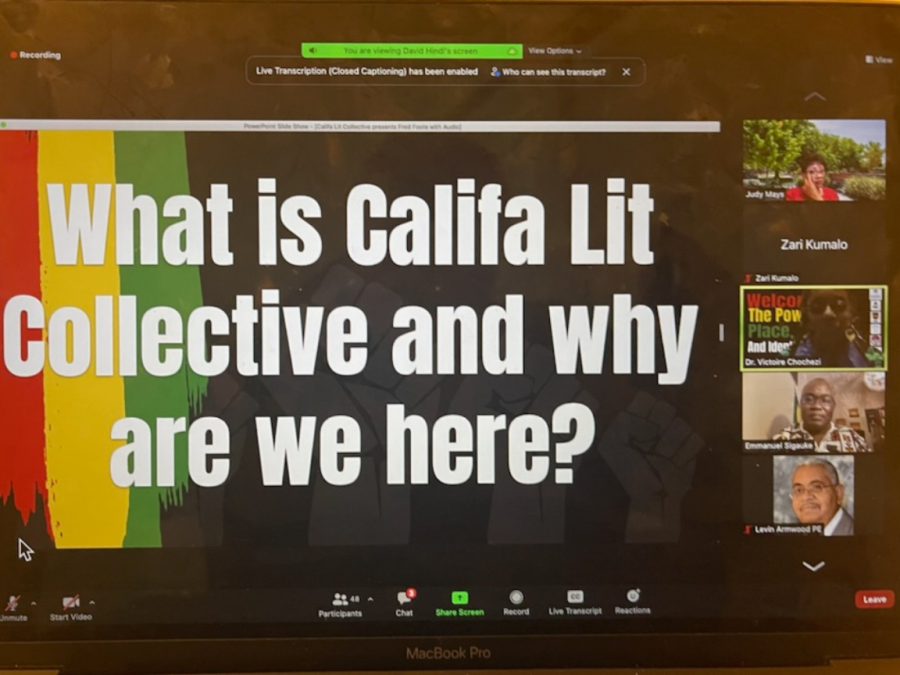New writing workshop discusses race and communities
The Califa Lit Collective presented a workshop called “The Power of Place, Race and Identity” on Oct. 21. Guest speaker Fred Foote discussed the background on the things he’s lived through.
The Califa Lit Collective presented a writing workshop on Oct. 21 called “The Power of Place, Race and Identity” with replacement guest speaker, Fred Foote.
The Califa Lit Collective is a group of faculty, staff and local authors affiliated with the Los Rios Community College District and the Sierra Joint Community College District.
It was noted that the original speaker, Charlotte Hill O’Neal had double-booked herself and the planning team made a last-minute replacement with Foote.
“He is a published writer and since 2014 has published over 300 poems, short stories, Afro-futuristic literature and has published three books,” Sierra College English Professor Michelle Johnson said.
Johnson said she was informed about several writing instructors from the Los Rios Community College District wanting to put together a writing collective.
“At first for Umoja students, but then we decided to expand it to Black, Indigenous, People of Color students, Asian American and Pacific Islander students, students of color who may feel that they don’t necessarily have a space in predominantly white institutions to share their stories,” Johnson said.
Foote shared background on the things he’s lived through.
“I’ve never seen a Mexican, Asian, Portuguese, or Muslim person in Virginia,” Foote said.
He also said the number of people, languages and cultures amazed him and twisted him in circles.
“Outside of the code neighborhoods, some schools were 90% white,” Foote said. “California integration was just another kind of segregation.”
Foote said he grew to appreciate the idea that public housing was a great public benefit because it could help communities thrive and help individuals grow.
“And it was kind of a great thing to be in that projects because we had what I had just left: they had a Black community,” Foote said.
He also said his community was all segregated in the beginning, in one project unit. He described it as being like home.
“Having the continuity of community is what kept me alive, helped me to survive,” Foote said. “They made me understand how essential it was that we live with each other, communicate with each other and establish our own standards and directions.”
Rose Green, a 23-year-old business and administrations major at Sierra College said Foote’s speech was “dope.”
“Knowing that the individual that is still with us, witness the stuff that we have to read about is crazy because I can only imagine what he went through,” Green said.
Green said she is still able to relate today because the cycle is still going on.
“I just feel like it was really hard for him and for him to make it through and be as successful as he is, is just dope,” Green said.
Green, who is a part of the planning team for the Califa Lit Collective, said she’s been writing for a long time, but never took it seriously.
“Honestly, it’s my literature teacher that’s bringing it out of me because the assignments she’s given us just make me bring up a lot of stuff in my past life and things that are going on now,” Green said.
Green said her literature teacher is Michelle Johnson.
“It’s really interesting to see other people really pay attention to my work when I really didn’t think of anything,” Green said.
Folsom Lake College Communication Studies Assistant Professor Victoire Chochezi said the mission of Califa is to amplify BIPOC voices, especially BIPOC students and they hope others will spread the word so that more people are brought into the collective.
She said the collective wants students to start feeling comfortable enough to take on more roles in terms of planning and implementing these workshops.
“We want to promote more confidence among students and in their writing,” Chochezi said. “We want our students to start being published.”
She added that in the workshop, the collective gave at least one resource where students can submit work for publication.
Foote shared what makes an individual a better writer.
“In writing, you have to write,” Foote said. “You can talk about the great ideas that you have, the dreams that you have and the notes that you take, but you have to write something and you have to complete something.”
Foote said it doesn’t have to be good and you don’t have to be proud of it.
“You can tear it up, but you have to write something and complete something,” Foote said. “And if you don’t, you’re dreaming of being a writer, but you’re not a writer.”

